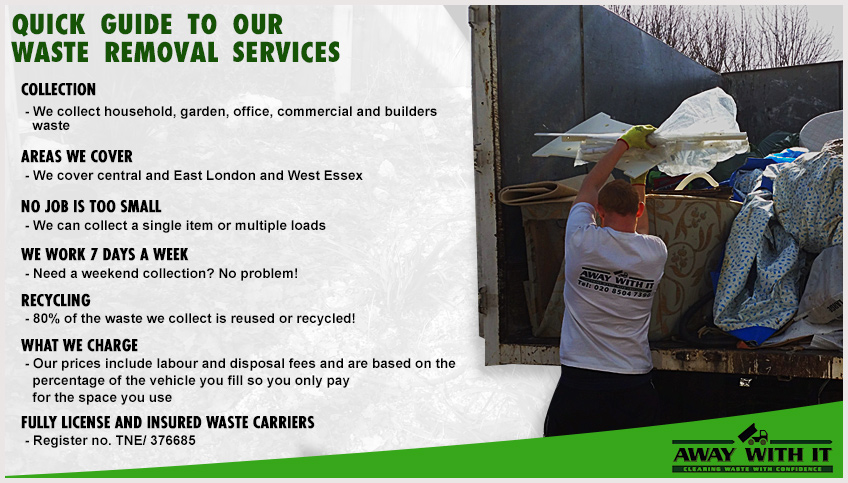Clearing your WEEE (Waste Electrical and Electrical Equipment) recycling is very important to address the environmental impact of putting electrical equipment in landfills. At Away With It we pride ourselves as a WEEE recycling company that recycles 100% of all WEEE we collect.
At Away With It, we understand how important it is to be on time and complete the work so you can get on with your work or day. Our two-man teams work together to clear your WEEE recycling.
The goods covered by the Waste Electrical and Electronic Equipment (WEEE) Regulations fall into the following categories:
Large household appliances, e.g. fridges, radiators and air conditioning appliances
Small household appliances, e.g. sewing machines, toasters and clocks
IT and telecommunications equipment, e.g. computers and their accessories, calculators and phones
Consumer equipment, e.g. TVs, radios and musical instruments
Lighting equipment, e.g. fluorescent lamps and non-household luminaires
Electrical and electronic tools, e.g. drills, welding equipment and lawnmowers
Toys, leisure and sports equipment, e.g. electric train sets, video games and slot machines
Medical devices, eg dialysis machines, ventilators and radiotherapy equipment
Monitoring and control instruments, e.g. smoke detectors, thermostats and other instruments used in industrial installations
Automatic dispensers, eg drinks, food and money dispensers
Display equipment
Cooling appliances containing refrigerants
Gas discharge lamps.
The Fast and Flexible WEEE Recycling Company London & Essex
Here are just a few reasons why Essex and London businesses and homeowners trust and happily recommend us as your WEEE recycling company:
We are licensed waste carriers. You can trust us to do an entirely professional job and deal with all your waste properly and lawfully.
We are a local service provider and operate seven days a week from 7 a.m. to 11.30 p.m. Evening and weekend collections can always be arranged for your convenience.
We offer a fast, same-day collection service. Whenever you need us, we are only a phone call away.
Reservations are in two-hour slots, and we’ll always call ahead of time to let you know when we’ll be arriving so you’re not left hanging around.
Our straightforward pricing means there won’t be any disagreeable surprises when the job is finished. We quote the rate you will pay with no hidden additions.
We always sweep up when we’ve finished clearing your waste and leave your property neat and clean.
We recycle 100 per cent of the WEEE recycling we collect.
Call Us To Book Your WEEE Recycling
To discuss your WEEE recycling requirements, call us today on 0208 504 7390. We’re available seven days a week from 7 pm to 11.30 pm.
Our dedicated team will be more than happy to answer your questions and provide an affordable free estimate before booking you in at a convenient time.
Or you can submit your details using our easy request a quote form, and we will respond to you the same day.

Customer Reviews
Frequently Asked Questions
What is WEEE recycling?
What are the benefits of WEEE recycling?
Environmental Protection: Reduces the amount of e-waste in landfills, preventing harmful substances from leaching into the soil and water.
Resource Conservation: Recovers valuable materials, reducing the need for new raw materials and lowering the environmental impact of mining and manufacturing.
Energy Savings: Recycling materials typically consumes less energy compared to producing new materials from raw resources.
Economic Benefits: Creates jobs in the recycling and refurbishing industry and generates revenue from recovered materials.
Compliance and Responsibility: Helps manufacturers and consumers comply with regulations and promotes corporate social responsibility.
Types of WEEE
Large household appliances (e.g., refrigerators, washing machines)
Small household appliances (e.g., toasters, coffee makers)
IT and telecommunications equipment (e.g., computers, smartphones)
Consumer electronics (e.g., televisions, stereos)
Lighting equipment (e.g., fluorescent lamps, LED bulbs)
Electrical and electronic tools (e.g., drills, saws)
Toys, leisure, and sports equipment (e.g., electric trains, video games)
Medical devices (except implanted and infected products)
Monitoring and control instruments (e.g., thermostats, smoke detectors)
Automatic dispensers (e.g., vending machines)
Get a quote from us today!
What are the challenges in WEEE recycling?
Consumer Awareness: Lack of awareness and proper disposal practices among consumers can lead to improper handling of e-waste.
Collection and Infrastructure: Efficient collection and recycling infrastructure are needed to handle the volume and variety of e-waste.
Cost: Recycling can be expensive, especially for devices with low recoverable material value.
The WEEE Recycling Process?
Collection: WEEE is collected from various sources, such as households, businesses, and recycling centres.
Sorting and Transportation: Collected items are sorted into categories and transported to recycling facilities.
Dismantling: Devices are manually or mechanically dismantled to separate different components.
Shredding: Larger items are shredded into smaller pieces to facilitate further separation.
Separation: Advanced techniques such as magnetic separation, eddy current separation, and optical sorting are used to separate metals, plastics, and other materials.
Recovery: Valuable materials like gold, silver, copper, and rare earth metals are extracted for reuse.
Recycling and Disposal: Recovered materials are sent to specialised facilities for further processing, while non-recyclable parts are safely disposed of.
What are WEEE regulations and standards?
WEEE recycling is governed by various regulations and standards to ensure the safe and efficient handling of e-waste. In the European Union, the WEEE Directive (2012/19/EU) sets collection, recycling, and recovery targets for all electrical goods, encouraging the development of take-back systems and producer responsibility schemes. Other regions have similar regulations tailored to their specific needs and conditions.
Why is WEEE recycling so important?
WEEE recycling is critical to sustainable waste management and offers significant environmental and economic benefits. Effective recycling processes and regulations can mitigate the negative impacts of e-waste and contribute to a circular economy where materials are reused and recycled, reducing the need for new resources and minimising waste.



